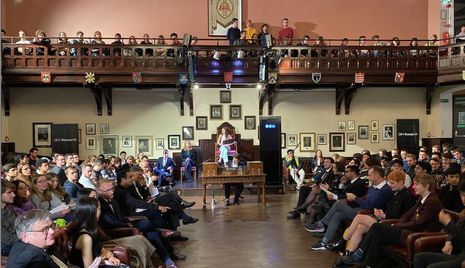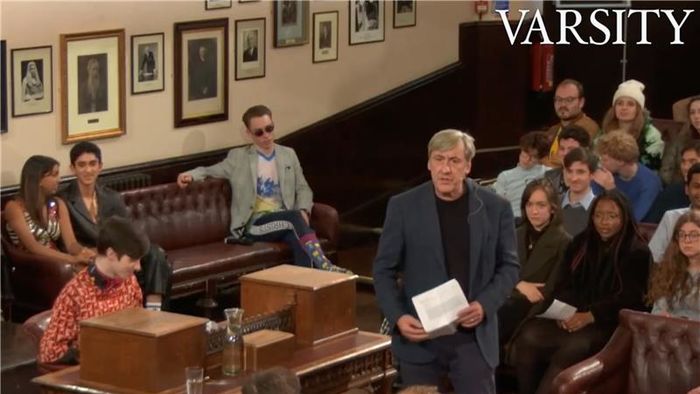I was Access Officer at The Cambridge Union: Here’s why I left
In sharing her experience as former Cambridge Union Access Officer, Amel Elleily argues that the Union remains an institution hostile to marginalised students

I was on the Union committee for one term. When I started my role as access officer, I believed wholeheartedly in the subcommittee I was a part of, and its project of widening participation to anyone who felt ostracised by the the Union and its exclusive reputation. The presence of the Equalities team may appear to demonstrate an active effort by the Union to create this equal environment, but I’m not so convinced. It seems to me that the team essentially functions to grant the Union the impression of an evolving, socially conscious institution to the wider University, while in reality little is being done to make marginalised members feel recognised.
“The fundamental nature of the society lies in opposition to the goals of those working hard to improve access”
The Equalities team is made up of officers to represent each marginalised group. Jude Jones, who was the LGBT officer during the same term, commented for this article. He describes the Union, and the structure of this team within it, as ‘tokenistic, unwilling to change, and uncommitted to confronting the inequalities within the institution’. As Access Officer, I felt this same tendency within the Union. While our subcommittee worked hard to host events that would expand the Union to a wider audience, such as collaborations with the 93% club, it inevitably felt like our events were added to the term card to give an impression, albeit only surface level, of inclusivity. The performative activism is best encapsulated in the following example: after running an event for Black History month, the Union then proceeded to allow racist comments to pass in a debate — yes, that infamous debate.
In the aftermath of the use of racial slurs in the debate, the first messages to the full committee group chat ignored the incident. Until students who had attended the debate voiced their disappointment, the committee showed no concern. It was my team’s responsibility to hold discussions to allow for anyone to voice their opinions on the Union. But even then, the outcome was largely unproductive. Though there were mentions of altering the Union constitution in order to prevent another incident like this and outlaw hate speech, it was not pursued. Law 14.2 of the constitution stipulates how debates and discussions should be conducted. An amendment to make clear that racism and any forms of hate speech are not tolerated could and should have been adopted. Yet, it wasn’t. Instead, the response of the Union to this incident makes it very clear that the fundamental nature of the society lies in opposition to the goals of those working hard to improve access and representation for its most vulnerable members.
“The role of the Union is to allow a small group of the wealthiest students to propel a political career”
Oxbridge has a well-known reputation for being a shut-off fortress, a place of the Bullingdon Club and a site of some of the world’s most privileged. The truth is, I have learned that this is grounded in reality. Looking back, I now believe it was ridiculously naïve of me to have hoped that my role and team were making a dent in how the Union functions. At its fundamental essence, the role of the Union is to allow a small group of the wealthiest students to establish and propel a political career. It is and always will be an old boys’ club. This has implications not just for Cambridge University, but for the country as a whole.
As soon as the term ended, I and all the members of my team left the Union. What we had thought would be a pastime, had became a great source of stress. I felt guilty for my part in the institution. I was an Access Officer, inviting and persuading ethnic and working-class students to pay ridiculous membership fees to join an institution careless of their presence; I find regret is too shallow of a word to encapsulate how I feel. This is why I implore that the purpose of the Equalities team within the structure of the Union is reflected upon. Whether it has been effective at diversifying membership should not be considered a complete success when constitutionally, marginalised students are not protected. If the Union is honestly committed to opening its doors to anyone and everyone, nowhere near enough has been done to achieve this.
The Cambridge Union committee changes termly. The writer of this article was part of the committee during Michaelmas 2021.
Varsity approached The Cambridge Union for comment (05/07).
 Comment / Plastic pubs: the problem with Cambridge alehouses 5 January 2026
Comment / Plastic pubs: the problem with Cambridge alehouses 5 January 2026 News / Cambridge academics stand out in King’s 2026 Honours List2 January 2026
News / Cambridge academics stand out in King’s 2026 Honours List2 January 2026 News / Cambridge businesses concerned infrastructure delays will hurt growth5 January 2026
News / Cambridge businesses concerned infrastructure delays will hurt growth5 January 2026 News / AstraZeneca sues for £32 million over faulty construction at Cambridge Campus31 December 2025
News / AstraZeneca sues for £32 million over faulty construction at Cambridge Campus31 December 2025 Interviews / You don’t need to peak at Cambridge, says Robin Harding31 December 2025
Interviews / You don’t need to peak at Cambridge, says Robin Harding31 December 2025









